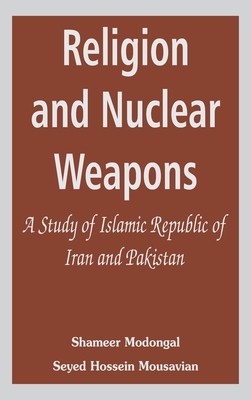
- We will send in 10–14 business days.
- Author: Shameer Modongal
- Publisher: VIJ BOOKS INDIA
- ISBN-10: 9393499594
- ISBN-13: 9789393499592
- Format: 15.2 x 22.9 x 1.1 cm, kieti viršeliai
- Language: English
- SAVE -10% with code: EXTRA
Reviews
Description
This book explores religion's role in shaping a state's nuclear policies. It analyses whether religion becomes a motivating or de-motivating factor in the nuclear weapons programs. The fatwa of Ayatollah Khamenei, the Iranian Supreme Leader, against nuclear weapons is an important factor in the recent debate over the possibility of nuclear weaponization in Iran. At the same time, Pakistan's nuclear tests of 1998 were labelled as tests of an 'Islamic bomb'.
The book also examines various theories on the causes of nuclear weaponization, adding the role of religion within their frameworks. It also explores religion's direct impact on nuclear policymakers and the indirect influence in nuclear policy by shaping social norms, strategic culture, and public opinion in countries.
EXTRA 10 % discount with code: EXTRA
The promotion ends in 23d.07:24:16
The discount code is valid when purchasing from 10 €. Discounts do not stack.
- Author: Shameer Modongal
- Publisher: VIJ BOOKS INDIA
- ISBN-10: 9393499594
- ISBN-13: 9789393499592
- Format: 15.2 x 22.9 x 1.1 cm, kieti viršeliai
- Language: English English
This book explores religion's role in shaping a state's nuclear policies. It analyses whether religion becomes a motivating or de-motivating factor in the nuclear weapons programs. The fatwa of Ayatollah Khamenei, the Iranian Supreme Leader, against nuclear weapons is an important factor in the recent debate over the possibility of nuclear weaponization in Iran. At the same time, Pakistan's nuclear tests of 1998 were labelled as tests of an 'Islamic bomb'.
The book also examines various theories on the causes of nuclear weaponization, adding the role of religion within their frameworks. It also explores religion's direct impact on nuclear policymakers and the indirect influence in nuclear policy by shaping social norms, strategic culture, and public opinion in countries.


Reviews